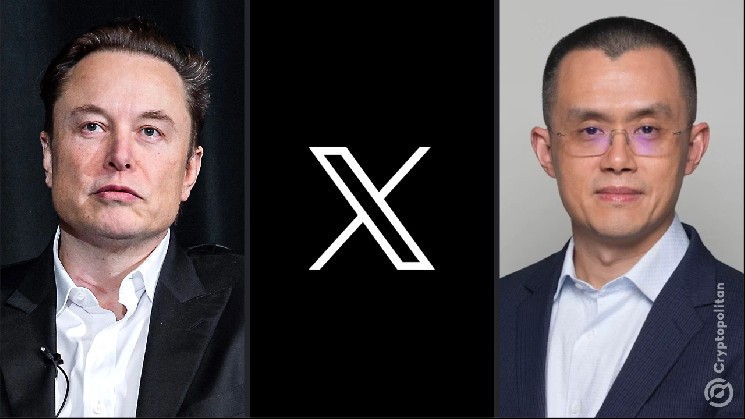CZ casually brags about helping Elon buy Twitter – “Happy to have contributed to the cause”

When you’re a heroic billionaire who helped finance the most controversial tech acquisition of the decade, you might want to remind people about it.
Changpeng “CZ” Zhao, founder and former CEO of Binance, did exactly that. He posted a screenshot, showing an article about Binance throwing in $500 million to help Elon Musk buy Twitter (now X), and captioned it with a confident, “Happy to have contributed to the cause.”
The response from Elon was: “Thanks!”
The $44 billion journey: From shareholder to owner
Elon’s road to owning Twitter was anything but smooth. It started in April 2022, when Elon became Twitter’s largest shareholder by purchasing a 9.1% stake. Shortly after, he made an unsolicited offer to buy the entire company for $44 billion, pricing the stock at $54.20 per share.
The reasoning? Elon claims he wanted to transform Twitter into a haven for free speech, claiming the platform had fallen victim to excessive censorship.
But things got bad fast. Elon tried to back out of the deal, citing concerns over spam accounts. Twitter’s board wasn’t having it and dragged Elon into court. After months of legal drama, Elon gave in and finalized the acquisition on October 27, 2022.
The price tag? $44 billion. And let’s be clear, many thought it was an insane overpayment for a platform struggling to stay relevant. But not CZ, evidently.
Chaos reigns at Twitter (or X, if you prefer)
The moment Elon walked into Twitter’s headquarters carrying a sink, it was clear this wasn’t going to be business as usual. One of his first moves was to fire half the workforce, including entire departments like content moderation and advertising sales.
Critics accused him of gutting the company’s infrastructure. Supporters called it necessary streamlining. Elon also rolled out major changes to the platform’s content policies. He promised a freer, more open platform.
What many users got instead was an increase in hate speech and misinformation. Advertisers, the lifeblood of Twitter’s revenue model, started fleeing. A survey revealed only 4% of advertisers felt X (the rebranded Twitter) was a safe place for their brands. The result? A massive dip in ad revenue.
Financially, things went from bad to worse. By late 2024, X’s valuation had plummeted to around $15 billion—down nearly 80% from the $44 billion Elon shelled out. Fidelity analysts argued that Elon had overpaid from the start, estimating Twitter’s actual value at the time of purchase closer to $30 billion.
Add to that over $1 billion in annual interest payments on loans taken to finance the deal, and Elon’s acquisition was shaping up to be a financial nightmare.
Who all bankrolled Elon’s X gamble?
Elon didn’t pull $44 billion out of thin air. He relied on a mix of his own wealth, bank loans, and backing from high-profile investors. Binance’s $500 million was just one piece of the puzzle.
Oracle co-founder Larry Ellison was another major contributor, as was Prince Alwaleed bin Talal, who retained his stake in Twitter. Former CEO Jack Dorsey also joined the list of backers, investing through a private entity.
Big-name venture capital firms jumped in too. Andreessen Horowitz, Sequoia Capital, and Gigafund all pitched in significant sums. Even alleged pedophile and sex offender Sean “Diddy” Combs made the list, investing through Sean Combs Capital, something Elon is constantly criticized for.
The eccentric billionaire also sold billions worth of Tesla stock to finance the deal, a move that didn’t sit well with Tesla investors. He secured roughly $12.5 billion in loans from banks, including senior secured loans and subordinated debt.
This financing structure left X with massive debt obligations that continue to weigh heavily on its finances. Elon’s goal now is to turn X into an “everything app,” similar to China’s WeChat. But executing that vision has proven to be anything but smooth. And he keeps adding on to his responsibilities with his recent involvement in the incoming US presidential administration.
User engagement has been a mixed bag. Some metrics show resilience, while others indicate declining activity due to policy changes and a rise in toxic content. Elon himself acknowledged the challenges, admitting the purchase brought him “mega pain” but insisting it was necessary for humanity to take the “good fork in the road.”
From Zero to Web3 Pro: Your 90-Day Career Launch Plan





 Bitcoin
Bitcoin  Ethereum
Ethereum  Tether
Tether  Dogecoin
Dogecoin  USDC
USDC  Cardano
Cardano  TRON
TRON  Chainlink
Chainlink  Stellar
Stellar  Hedera
Hedera  Bitcoin Cash
Bitcoin Cash  LEO Token
LEO Token  Litecoin
Litecoin  Cronos
Cronos  Ethereum Classic
Ethereum Classic  Monero
Monero  Dai
Dai  Algorand
Algorand  OKB
OKB  Cosmos Hub
Cosmos Hub  Stacks
Stacks  Theta Network
Theta Network  Gate
Gate  Maker
Maker  KuCoin
KuCoin  Tezos
Tezos  IOTA
IOTA  Zcash
Zcash  NEO
NEO  Polygon
Polygon  Synthetix Network
Synthetix Network  Tether Gold
Tether Gold  TrueUSD
TrueUSD  Dash
Dash  Holo
Holo  Zilliqa
Zilliqa  Enjin Coin
Enjin Coin  0x Protocol
0x Protocol  Basic Attention
Basic Attention  Qtum
Qtum  Siacoin
Siacoin  Ravencoin
Ravencoin  Bitcoin Gold
Bitcoin Gold  Decred
Decred  NEM
NEM  DigiByte
DigiByte  Ontology
Ontology  Nano
Nano  Hive
Hive  Status
Status  Huobi
Huobi  Waves
Waves  Lisk
Lisk  Numeraire
Numeraire  Steem
Steem  Pax Dollar
Pax Dollar  BUSD
BUSD  OMG Network
OMG Network  Ren
Ren  Bitcoin Diamond
Bitcoin Diamond